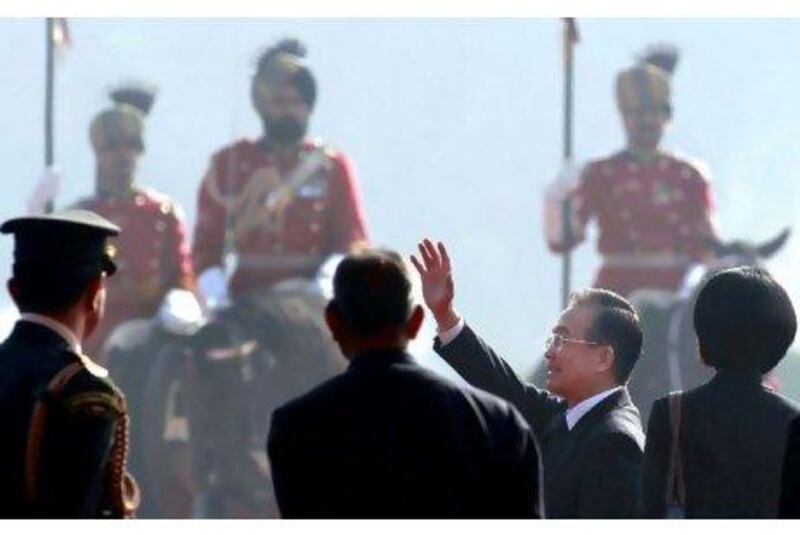Can the elephant and the dragon flourish in the same room?
Yes, insists Wen Jiabao, the Chinese premier, who arrived in India on a three-day tour last week shepherding a 300-strong business delegation.
He casually dismissed the metaphors often used to describe the growth momentum of the rising Asian giants: India, the diligent but slow and lumbering elephant; China, the dynamic but menacing and flame-spewing dragon.
"There is room for both China and India to grow and develop," Mr Wen said on his visit, during which 49 deals worth a total of US$16 billion (Dh58.76bn) were signed between Indian and Chinese companies. "We are not rivals; we are partners in progress."
But comparisons between two of the world's fastest-growing economies are inevitable.
Both are magnets for large foreign investments, but observers are perplexed by a curious paradox: India, a strong, stable democracy, has been a laggard in attracting foreign investment in comparison with China, a relatively illiberal, one-party autocracy.
China, observers say, encourages investment through a smoother and fairly hassle-free process of granting approvals, whereas India loses out because of its cumbersome regulations and procedural hurdles for starting businesses, enforcing contracts, procuring industrial licences and even filing for bankruptcy.
China attracted foreign direct investment of $90.03bn last year, nearly three times more than India's $34.6bn.
China holds the world's largest foreign currency reserves - estimated at $2.4 trillion. India's reserves are only about 11 per cent of China's - $263bn.
"In contrast to India, China's overall economic success has been based on low-cost manufacturing for export. India's development has been limited in this area by its regulatory environment," says Steven Dunaway, an adjunct senior fellow for international economics at the Council on Foreign Relations, a foreign-policy think tank in Washington. "With its large and relatively young population, India could easily out-compete China … if it would remove regulatory and labour market barriers that are holding it back."
Caught for decades in a socialist time warp, India witnessed accelerated growth since it began relaxing government controls over key sectors of its diverse economy in 1991. But the country's control-minded policymakers have ever since been slow in pushing growth-enhancing reforms, observers say.
"It is necessary to ease restrictions concerning approval procedures, capital flow and entry and exit of people, thus creating more favourable conditions for mutual investment," Mr Wen said during his visit.
Barack Obama, the US president, who visited India last month with the largest-ever delegation of American businessmen on an overseas tour, raised similar concerns.
US companies such as General Electric and Westinghouse Electric, a subsidiary of Japan's Toshiba, have expressed keen interest in nuclear trade projects worth $10bn after the Indo-US civilian nuclear agreement of 2008. But the companies are believed to be put off by new restrictions imposed by the Indian parliament in August in terms of raising the liability limit for foreign companies in the event of a nuclear disaster.
"US firms will likely be very reluctant to engage in nuclear trade with India" if the Indian government does not adhere to international norms on compensation for victims of nuclear accidents, the Congressional Research Service, a bipartisan research wing of the US Congress, warned in a recent report.
David Cameron, the British prime minister, who visited India with a similar business delegation in July, urged India to liberalise its large insurance market. At the moment, the Indian government permits joint ventures, with foreign companies holding a maximum 26 per cent stake. He asked for the limit to be raised to 49 per cent.
Global retail giants such as Walmart, Carrefour and Tesco are keen to tap into India's fast-growing consumer market, but the sector remains heavily regulated with strict limits on foreign investment.
Foreign investors are allowed to own up to 51 per cent of single brand retailers - stores that sell products of one brand only. That means foreign retailers are allowed to operate only in partnership with Indian subsidiaries. For years, they have been pushing for government approval of foreign investment in multi-brand retail, which would allow them to sell directly to the Indian consumer. But the government has not responded favourably so far.
Despite the limitations, India is still attracting more foreign capital than most other Asian countries, according to the Securities and Exchange Board of India. The country attracted $4.78bn from foreign institutional investors last month, taking the total inflow for the year so far to a record of $38.76bn.
The global consultancy Bain & Company expects private equity and venture capital investments in India to reach $17bn this year. In a recent survey of 75 leading global investors, it found that the number of respondents eager to invest in the range of $200 mllion to $500m had risen fourfold this year to 27 per cent.
Some experts advise caution before India further liberalises key sectors to avoid overheating its economy and to protect domestic companies.
"India has adopted a gradualist approach in liberalisation, opening up sectors one after the other rather than in one go and also in stages within a sector. This has sometimes been perceived as frustrating and tardy by foreign investors, but it has spelt stability in FDI flows," says Rajesh Chakrabarti, an assistant professor of finance at the Indian School of Business in Hyderabad. "Gradually, most of the sectors today are likely to be opened as well, but after the domestic players have had time to adjust to the new globalised rules of business."





